翟象俊《21世纪大学英语读写教程(4)》(修订版)学习指南-unit1【圣才出品】
- 格式:pdf
- 大小:1.09 MB
- 文档页数:52
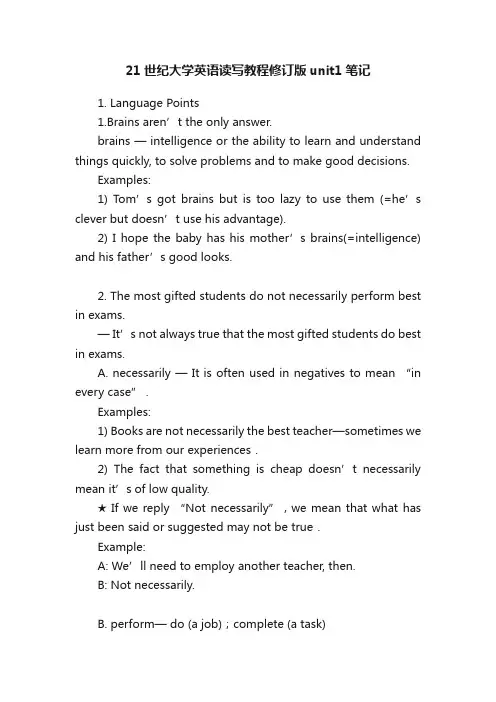
21世纪大学英语读写教程修订版unit1笔记1. Language Points1.Brains aren’t the only answer.brains — intelligence or the ability to learn and understand things quickly, to solve problems and to make good decisions.Examples:1) Tom’s got brains but is too lazy to use them (=he’s clever but doesn’t use his advantage).2) I hope the baby has his mother’s brains(=intelligence) and his father’s good looks.2. The most gifted students do not necessarily perform best in exams.—It’s not always true that the most gifted students do best in exams.A. necessarily —It is often used in negatives to mean “in every case” .Examples:1) Books are not necessarily the best teacher—sometimes we learn more from our experiences.2) The fact that something is cheap doesn’t necessarily mean it’s of low quality.★ If we reply “Not necessarily”,we mean that what has just been said or suggested may not be true.Example:A: We’ll need to employ another teacher, then.B: Not necessarily.B. perform— do (a job);complete (a task)Examples:1) Computers can perform many different tasks.2) The firefighters performed outstanding acts of bravery in the September 11 attack.◆ perform well/badly/poorly — work well/badly/poorly;achieve a good/poor result3. make the most of (sth./sb.)— to gain the greatest possible advantage from something Examples:1) The young lady has learned to make the most of every opportunity offered to her.2) One secret of A students is to make the most of the university library.3) We've only got one day in Paris, so we'd better make the most of it.★ make the most of sth. = make the most out of sth.4. count for much/little/nothing— be of much/little/no worth or importanceExamples:1) He knows only one side of the story and therefore his opinion counts for very little.2) A man with no sense of responsibility does not count for anything.3) His promises don't count for much.4) His overseas results count for nothing.5. Hard work isn’t th e whole story either.— Hard work is not enough to explain everything either.A. not the whole story / only part of the story — not enough for a situation to be fully understoodExample:1) It’s true that I don’t like my boss, but that is not the whole story/only part of the story. I quit because I’ve found a better job.2) Quarrelling every day is not the whole story/only part of the story of the couple’s separation. The most important reason is that they don’t love each other any longer.B. Some other usages of “story”:Examples:1)Well. I’ve never cheated in exams, though I know people who have, but that’s another story. (That’s something I’m not going to talk about.)2) Where they live, the climate is fairly dry, but a little further north it's a different story. (The situation is different.)3) People come and people go. It's the same old story. (It happens again and again.)6. put in— spend, pass (a specified amount of time, etc.)Examples:1) I hurried to the library, only to find that there was still an hour to put in before it opened.2) He worked like a slave putting in fifteen hours of work daily.3) On weekend, I sometimes enjoy putting in a pleasant afternoon in the public library.7. concentrateA) — [intransitive] to think very carefully about something that you are doingExamples:1) Sally tried to concentrate on her studies in spite of thenoise.2) It’s said that yoga can help you concentrate better.3) Now please concentrate.4) Adrian was finding it difficult to concentrate.B) —[intransitive and transitive] to be present in large numbers or amounts somewhere, or to cause people or things to be present in large numbers or amounts somewhere Examples:1) Italian industry is concentrated mainly in the north.2) Construction of the aircraft is being concentrated at Prestwick.3) Women concentrate in a small number of occupations.8. Once the books are opened, phone calls go unanswered, TV unwatched and newspapers unread.—Once they open their books, they would not answer phone calls, nor watch TV or read newspapers.Examples:1) The baby’s cry went unheard. (Nobody heard the baby’s cry.)2) Some guests at the party went unattended. (Nobody attended them.)3) All the books on the table went untouched. (Nobody touched the books.)9. focus—direct one’s attention, etc. on sth.Examples:1) Today’s topic focused on Chinese festivals.2) Their search effort focused on the development of a new chemical.◆ ‘‘Focus’’ is similar to “concentrate” in the sense ofdirecting one’s attention on sth. However, “focus” can also mean “adjust a lens, or the eyes, so that the image that passes through them is sharp and clear.”Examples:1) She turned the camera and focused on Martin's face.2) His eyes were focused straight ahead.10. stick (stuck, stuck)— attach (sth.) to (sth. else) or on (a surface)Examples:1) Can you stick the two pages together?2) Susan stuck an important message on the bulletin board.stick to — keep to, refuse to leave or changeExamples:1) In spite of the difficulties, the government sticks to the present policy.2) Make sure to stick to the point when making a presentation in front of the class.3) He is a man of principle — he always sticks to his principles.11. bathroom— a room with a bath in it, usu. also containing a lavatory,wash basin, etc.In British English the toilet in private houses is called the lavatory, toilet, WC (dated), or 100 (informal). In public places it is called the Gents / the Ladies or public conveniences. In American English it is called the lavatory, toilet or bathroom in private houses and the washroom or restroom in public places.“Restroom” is sometimes misunderstood by some Chinese learners as a room where people sit and relax, while the proper word for that meaning should be “lounge”.12. get one’s hands on— get hold of (sth. or sb. ), esp. violently; seizeExamples:1) The hungry boy ate up everything he could get his hands on from the refrigerator.2) The woman smashed every plate she could get her hands on in a terrible fight with her husband.3) The book was sold out, and the girl had to go downtown to finally get her hands on a copy .13. essential— (1) n. (usu. pl.) sth.that is necessary or very important Examples:1) This book includes all the essentials for camping in the wilderness .2) “Mom, don’t you know a mobile phone and MP3 are absolute essentials for a young man of my age?”— (2) a. (to, for) necessary, centralExamples:1) Vegetables are essential to our health .2) Political stability is essential for economic development.14. cut down on— reduceExamples:1) The already skinny girl declared she would cut down on food so as to lose weight .2) The doctor urged the patient to cut down on smoking and drinking .3) There is talk that they are going to cut down on government spending .15. write up— write (again) in a neat and complete formExamples:1) The results of the experiment were written up into a report .2) His secretary always writes up the notes of a speech for him .3) It took the student reporter a whole week to write up a story to the satisfaction of the newspaper editor .In some phrases, the adverb “up” carries the meaning of “to an end or a state of completion; completely”.Examples:1) We used up our petrol halfway on the journey and could not find a gas station nearby .2) The fire burnt up all our furniture .3) When are you going to pay up the money you owe me?16. Meet the deadline— finish the task before the date or time it must be finished◆ “Meet the deadline” is a common collocation. Similarly, if you haven’t met the deadline, then you have missed the deadline.◆ 17. work/do wonders (in)◆ — bring unexpectedly good results◆Examples:1) There’s no way I can meet the deadline.2) I’m afraid you’ve missed the deadline, so your application cannot be considered.Examples:1) A few words of encouragement can work wonders in me when I’m not very confident.2) The old lady was so difficult to please,but the girl has worked wonders in her.3) The student tried the new approach, and to his amazement, itworked wonders!18. relevant (ant. irrelevant)—directly connected with the subject or problem being discussed or consideredExamples:1) I’m searching the net for some relevant information about my thesis.2) It’s irrelevant to our discussion? No, I think it’s highly relevant to what we are discussing!19. rather than◆ This expression is normally used in“parallel” structures:for example with two adjectives,adverbials,nouns, infinitives or -ing forms.Examples:1) The color seems green rather than blue.2) I’d prefer to go in August rather than in July.3) Why don’t you wear the black shoes rather than the brown ones?4) I’ll help you rather than sit and watch you struggle.5) He always prefers starting early rather than leaving everything to the last minute.When the main clause has a to-infinitive, rather than is usually followed by an infinitive without to. An -ing form is also possible, especially at the beginning of a sentence.Examples:1) I’d like to stay at home this evening rather than go/going out .2) Rather than using the last of his cash, Tom decided to writea check.20. put away— put in the usual place of storage, put or store (sth.) in its proper placeExamples:1) The spoilt kid never put his toys away.2) Please put the newspaper away on the shelf when you finish reading.3) The business correspondence was all put away in numbered files.21. approach n. / v.A) n. — way of dealing with a particular problemExamples:1) We need a new approach to this problem.2) Do you believe that the best approach for a language learner is the study of the spoken language?B) v. — to move towards or nearer to someone or somethingExamples:1) As I approached the house, I noticed a light on upstairs.2) She heard footsteps approaching.Grammar focus1. go + (un) p.p.Examples:a. Phone calls go unanswered.— Phone calls are unanswered.b. They never solved the problem.—Problem went unsolved.c. Police failed to identify the owner of the black car. — The owner went unidentified.2. used to + infinitive“used to + infinitive” refers to a past habit or state,while“get used to + n/-ing” means “become used to”Examples:a. Where did you use to live?I used to live with my family.How about now?I have got used to sharing a dormitory room with several others.b. How did people use to keep food?People used to keep food by salting it.How about now?Nowadays more and more people have got used to keeping their food inthe refrigerator.。
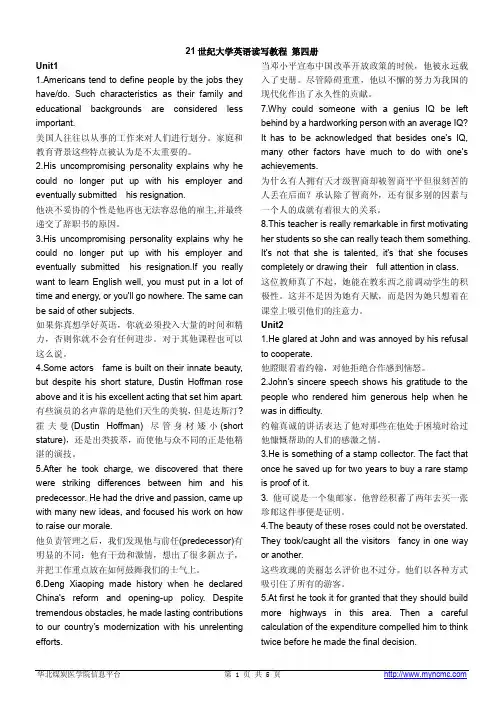
21世纪大学英语读写教程第四册Unit11.Americans tend to define people by the jobs they have/do. Such characteristics as their family and educational backgrounds are considered less important.美国人往往以从事的工作来对人们进行划分。
家庭和教育背景这些特点被认为是不太重要的。
2.His uncompromising personality explains why he could no longer put up with his employer and eventually submitted his resignation.他决不妥协的个性是他再也无法容忍他的雇主,并最终递交了辞职书的原因。
3.His uncompromising personality explains why he could no longer put up with his employer and eventually submitted his resignation.If you really want to learn English well, you must put in a lot of time and energy, or you'll go nowhere. The same can be said of other subjects.如果你真想学好英语,你就必须投入大量的时间和精力,否则你就不会有任何进步。
对于其他课程也可以这么说。
4.Some actors fame is built on their innate beauty, but despite his short stature, Dustin Hoffman rose above and it is his excellent acting that set him apart. 有些演员的名声靠的是他们天生的美貌,但是达斯汀?霍夫曼(Dustin Hoffman) 尽管身材矮小(short stature),还是出类拔萃,而使他与众不同的正是他精湛的演技。
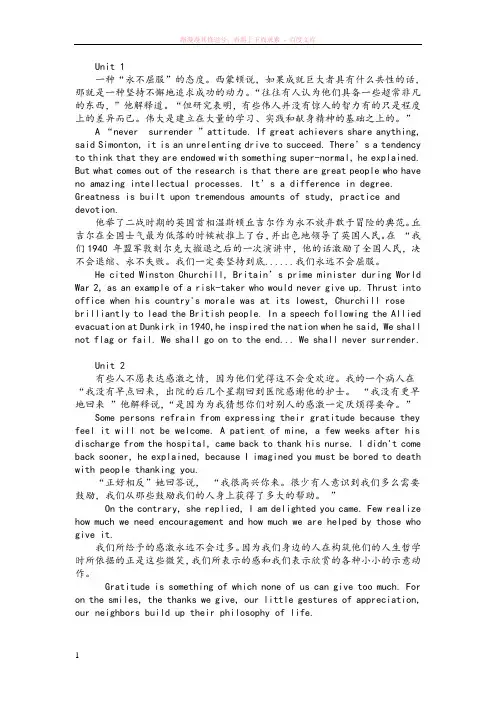
一种“永不屈服”的态度。
西蒙顿说,如果成就巨大者具有什么共性的话,那就是一种坚持不懈地追求成功的动力。
“往往有人认为他们具备一些超常非凡的东西,”他解释道。
“但研究表明,有些伟人并没有惊人的智力有的只是程度上的差异而已。
伟大是建立在大量的学习、实践和献身精神的基础之上的。
”A “never surrender ”attitude. If great achievers share anything, said Simonton, it is an unrelenting drive to succeed. There’s a tendency to think that they are endowed with something super-normal, he explained. But what comes out of the research is that there are great people who have no amazing intellectual processes. It’s a difference in degree. Greatness is built upon tremendous amounts of study, practice and devotion.他举了二战时期的英国首相温斯顿丘吉尔作为永不放弃敢于冒险的典范。
丘吉尔在全国士气最为低落的时候被推上了台,并出色地领导了英国人民。
在“我们1940 年盟军敦刻尔克大撤退之后的一次演讲中,他的话激励了全国人民,决不会退缩、永不失败。
我们一定要坚持到底......我们永远不会屈服。
He cited Winston Churchill, Britain’s prime minister during World War 2, as an example of a risk-taker who would never give up. Thrust into office when his country's morale was at its lowest, Churchill rose brilliantly to lead the British people. In a speech following the Allied evacuation at Dunkirk in 1940,he inspired the nation when he said, We shall not flag or fail. We shall go on to the end... We shall never surrender.Unit 2有些人不愿表达感激之情,因为他们觉得这不会受欢迎。
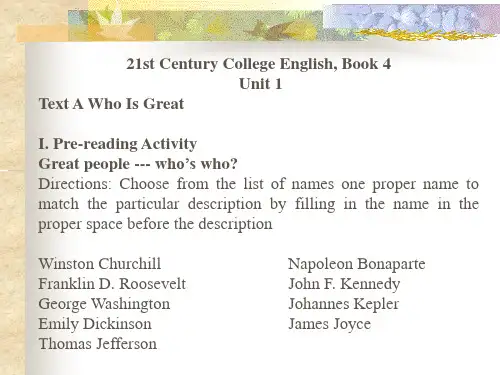
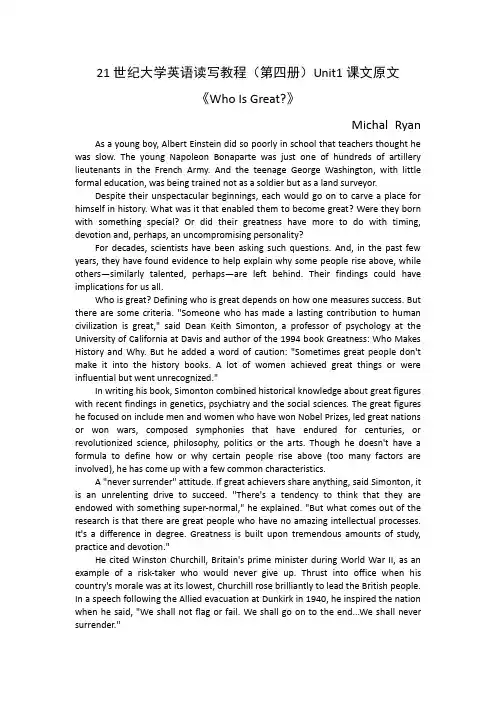
21世纪大学英语读写教程(第四册)Unit1课文原文《Who Is Great?》Michal Ryan As a young boy, Albert Einstein did so poorly in school that teachers thought he was slow. The young Napoleon Bonaparte was just one of hundreds of artillery lieutenants in the French Army. And the teenage George Washington, with little formal education, was being trained not as a soldier but as a land surveyor.Despite their unspectacular beginnings, each would go on to carve a place for himself in history. What was it that enabled them to become great? Were they born with something special? Or did their greatness have more to do with timing, devotion and, perhaps, an uncompromising personality?For decades, scientists have been asking such questions. And, in the past few years, they have found evidence to help explain why some people rise above, while others—similarly talented, perhaps—are left behind. Their findings could have implications for us all.Who is great? Defining who is great depends on how one measures success. But there are some criteria. "Someone who has made a lasting contribution to human civilization is great," said Dean Keith Simonton, a professor of psychology at the University of California at Davis and author of the 1994 book Greatness: Who Makes History and Why. But he added a word of caution: "Sometimes great people don't make it into the history books. A lot of women achieved great things or were influential but went unrecognized."In writing his book, Simonton combined historical knowledge about great figures with recent findings in genetics, psychiatry and the social sciences. The great figures he focused on include men and women who have won Nobel Prizes, led great nations or won wars, composed symphonies that have endured for centuries, or revolutionized science, philosophy, politics or the arts. Though he doesn't have a formula to define how or why certain people rise above (too many factors are involved), he has come up with a few common characteristics.A "never surrender" attitude. If great achievers share anything, said Simonton, it is an unrelenting drive to succeed. "There's a tendency to think that they are endowed with something super-normal," he explained. "But what comes out of the research is that there are great people who have no amazing intellectual processes. It's a difference in degree. Greatness is built upon tremendous amounts of study, practice and devotion."He cited Winston Churchill, Britain's prime minister during World War II, as an example of a risk-taker who would never give up. Thrust into office when his country's morale was at its lowest, Churchill rose brilliantly to lead the British people. In a speech following the Allied evacuation at Dunkirk in 1940, he inspired the nation when he said, "We shall not flag or fail. We shall go on to the end...We shall never surrender."Can you be born great? In looking at Churchill's role in history—as well as the roles of other political and military leaders—Simonton discovered a striking pattern: "Firstborns and only children tend to make good leaders in time of crisis: They're used to taking charge. But middle-borns are better as peacetime leaders: They listen to different interest groups better and make the necessary compromises. Churchill, an only child, was typical. He was great in a crisis, but in peacetime he was not effective—not even popular."Timing is another factor. "If you took George Washington and put him in the 20th century he would go nowhere as a politician," Simonton declared. "He was not an effective public speaker, and he didn't like shaking hands with the public. On the other hand, I'm not sure Franklin Roosevelt would have done well in Washington's time. He wouldn't have had the radio to do his fireside chats."Can you be too smart? One surprise among Simonton's findings is that many political and military leaders have been bright but not overly so. Beyond a certain point, he explained, other factors, like the ability to communicate effectively, become more important than innate intelligence as measured by an IQ test. The most intelligent U.S. Presidents, for example—Thomas Jefferson, Woodrow Wilson and John F. Kennedy—had a hard time getting elected, Simonton said, while others with IQs closer to the average (such as Warren G. Harding) won by landslides. While political and economic factors also are involved, having a genius IQ is not necessary to be a great leader.In the sciences, those with "genius level" IQs do have a better chance at achieving recognition, added Simonton. Yet evidence also indicates that overcoming traditional ways of thinking may be just as important.He pointed to one recent study where college students were given a set of data and were asked to see if they could come up with a mathematical relation. Almost a third did. What they did not know was that they had just solved one of the most famous scientific equations in history: the Third Law of Planetary Motion, an equation that Johannes Kepler came up with in 1618.Kepler's genius, Simonton said, was not so much in solving a mathematical challenge. It was in thinking about the numbers in a unique way—applying his mathematical knowledge to his observations of planetary motion. It was his boldness that set him apart.Love your work. As a child, Einstein became fascinated with the way magnets are drawn to metal. "He couldn't stop thinking about this stuff," Simonton pointed out. "He became obsessed with problems in physics by the time he was 16, and he never stopped working on them. It's not surprising that he made major contributions by the time he was 26.""For most of us, it's not that we don't have the ability," Simonton added, "it's that we don't devote the time. You have to put in the effort and put up with all the frustrations and obstacles."Like other creative geniuses, Einstein was not motivated by a desire for fame, said Simonton. Instead, his obsession with his work was what set him apart.Where such drive comes from remains a mystery. But it is found in nearly allcreative geniuses—whether or not their genius is acknowledged by contemporaries."Emily Dickinson was not recognized for her poetry until after her death," said Simonton. "But she was not writing for fame. The same can be said of James Joyce, who didn't spend a lot of time worrying about how many people would read Finnegans Wake."Today, researchers have evidence that an intrinsic passion for one's work is a key to rising above. In a 1985 study at Brandeis University conducted by Teresa Amabile, now a professor of business administration at Harvard University, a group of professional writers—none famous—were asked to write a short poem. Each writer was then randomly placed in one of three groups: One group was asked to keep in mind the idea of writing for money; another was told to think about writing just for pleasure; and a third group was given no instruction at all.The poems then were submitted anonymously to a panel of professional writers for evaluation. The poetry written by people who thought about writing for money ranked lowest. Those who thought about writing just for pleasure did the best. "Motivation that comes from enjoying the work makes a significant difference, "Amabile said.。

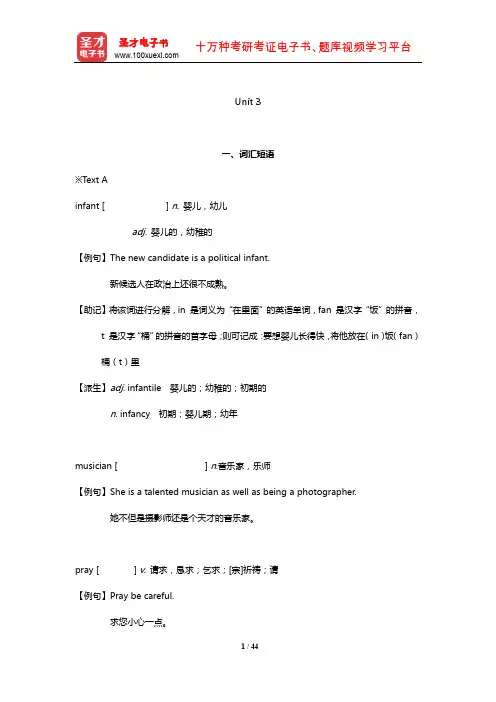
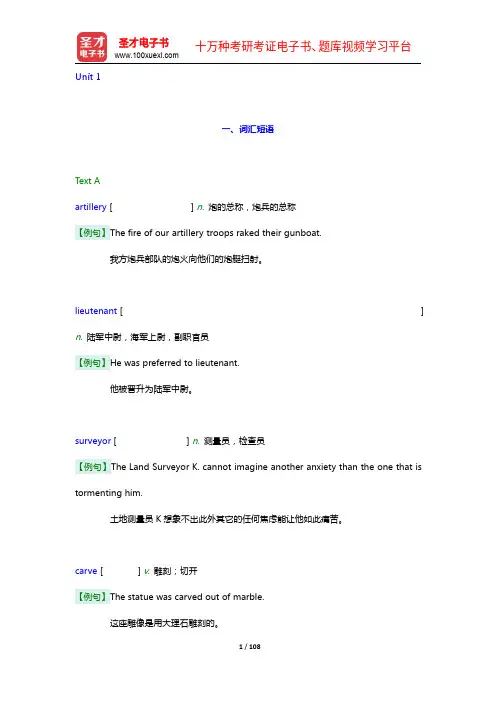



21世纪大学英语读写教程第四册完形填空Unit 1There are many paths to greatness. Some people go down in history for their 1)_ influential _ political leadership. Other are remembered for spectacular scientific 2)__ breakthroughs _ for composing great symphonies, or writing 3)__ brilliant __ poetry. But whatever path they take, great people seem to 4)__ share __ a few common characteristics. They are relentlessly 5)__ optimistic __ and persistent; they have both intellectual skills and the ability to work well with other people; and they love their work. In fact, 6)_ for _ these people, work is more like an obsession than a job. Of course, many of the questions about greatness 7)__ remain __, unanswered. What roles so genetics and environment 8)__ play __in the question ? How can we know who among our 9)contemporaries will be remembered as great and which people, though famous today, will be 10)__ forgotten __ in the future? It’s also possible that our 11)_ view _ of who is great is not always fair or accurate. For example, the of 12)_ achievement__ women are not recognized as often as they should be.Finally, we can’t even be 13)__ sure__ if it is really good to be great. Maybe the happiest people are the normal ones. Normal people aren’t endowed 14)_ with _ what it t akes to be great, but they also don’t have to worry 15)_ about _ the burdens of history.Unit 2Gratitude is defined as the art of showing 1)__ appreciation __ for every kindness, great and small. Usually, 2)__expressing _ gratitude costs very little, but its rewards can be great. When gratitude is owed but not given, however, as when we 3)_ fail _ to recognize a ge nerous act on someone else’s 4)_ part _, this denial can lead to sore feelings, and even resentment. Sometimes, truly deep gratitude calls for personal sacrifice. One 5)_ example __ is a mother of world war II soldier who traveled from her home 6)_ through __ the U. S. to visit the French family who had 7)___ sheltered ___ her son from Nazis. She was driven to 8)__ do this unselfish generosity which this family had shown her son. But gratitude can 9)_ also _ be shown by very simple acts. We can start 10)__ by __ making sure that, in one way or another, we thank the family members and 11)_ coworkers__ who help us every day. In sum, the 12)_ key _ to gratitude is thoughtfulness, or 13)_ taking __ pains to consider the feeling of others as well as out own. Being generous and 14)_ unselfish _ with our affection and sentiments is one thing we all can do to make the world a more pleasant place. For all of these 15)_ reasons _ gratitude is something of which none of us can give too much..Unit 3Traditional western ways of thinking can often lead to an 1)_ impasse _ when we are confronting a truly difficult problem. This happened to Dr. Edward Jenner when he was trying to 2)_ come _ up with a vaccine for the deadly disease known as smallpox. Jenner was 3)_ able _ to solve the problem he faced by changing the 4)_framework within which he looked at it. Rather than focusing on people who had smallpox, he 5) looked carefully at those who seemed never to get the disease. This change in 6)_tactics _ is an example of what is known as “lateral thinking.” The term means choosing not to approach a problem head-on, but instead looking at it 7)__ sideways _. In lateral thinking, being able to take in and 8)_consider _ all kinds of ideas, no matter how unlikely they might seem, is of the 9)_ utmost _ significance. Lateral thinking can help all kinds of people, from smokers who want to give10)__ up _ their habit, to archers who need to relax in order to perform 11)_ at _ their best. This idea does not 12)_imply that solutions which come from vertical thinking are always deeply 13) flawed _ . The truth is that different ways of thinking have different 14)_ advantages when you get stuck struggling with a problem head-on, thinking laterally can help you to shift your point of view and perhaps see a 15)_ solution you wouldn’t other wise notice.Unit 4A recent educ ational experiment showed that the difference between “gifted” children and regular ones may have as much as to do with 1)__expectations__ as with intelligence. An elementary school teacher was 2)_deceived__ into thinking that her students were above average in intelligence. She then 3)__managed__ to get them to do outstanding work, even though their true IQs were well within the normal range. It seems that her belief in her students’ intelligence was enough to turn them 4)_into_ better learners.It’s diffic ult to 5)__pinpoint __exactly how such beliefs are expressed. It 6)__may __have to do with how a teacher talks to the class: many positive, supportive expressions and few expressions of impatience, annoyance, or 7)__irritation__.Non-verbal communication, including 8)_facial __expressions, probably plays a role too. But one thing is clear: labels and expectations 9)__strongly _ influence results. Outside of the classroom, labeling can, as 10) often__ as not, have a negative effect. The labels we put on different social groups are usually not 11)__inclusive__. In fact, they are often sexist or racist. Of 12)__course__ , there is good and bad in all kinds of people. But we 13)__tend__to accept some ideas about certain groups more readily than about others. The school experiment shows that such labels have a 14)__great__ deal of power. But when labels are unfair and negative they can be very 15)__damaging__.Unit 11.美国人往往以从事的工作来对人们进行划分。
21世纪大学英语读写教程课文翻译(第四册)Unit1-TextA谁是伟人?迈克尔·赖恩当阿尔伯特·爱因斯坦是个小男孩的时候,他在学校里的成绩很差,老师们都觉得他反应迟钝。
拿破仑·波拿巴年轻时只是法国陆军中几百名炮兵中尉中的一名。
没有接受过什么正规教育的乔治·华盛顿,十几岁时不是受训当兵而是受训做土地测量员。
尽管他们的起步平淡无奇,但是后来个个都青史留名。
究竟是什么使他们成了伟人呢?是否他们生来就有什么特别?亦或他们的伟大与生逢其时、与献身精神,也许与一种坚定的个性更为有关?几十年来,科学家们一直在问这样的问题。
在过去几年里,他们已经发现了一些情况,这些情况有助于解释为什么有些人出类拔萃,而另一些人----也许同样具有才华----却被抛在了后面。
他们的发现可能对我们每个人都有意义。
谁是伟人?伟人的定义取决于如何衡量成功。
但标准还是有的。
“对人类文明作出永久性贡献的人是伟大的,”基思·西蒙顿院长说。
他是加州大学戴维斯分校的一名心理学教授,是1994年出版的《伟大:谁创造了历史,原因何在》一书的作者。
但他又提醒说:“有时侯伟人并没有被载入史册。
许多女性取得了巨大成就,或者颇具影响力,但却没有得到公认。
在这本书的写作中,西蒙顿融合了关于伟大人物的历史知识以及遗传学、精神病学和社会科学领域的最新发现。
他所聚焦的伟人包括获得过诺贝尔奖、领导过伟大国家或打赢过战争、谱写过流芳百世的交响乐、或在科学、哲学、政治、艺术上引起过巨变的男女人物。
虽然他没有一个公式来解释有些人怎样或者怎么出类拔萃(涉及的因素太多了),但他却提出了一些共同的特点。
一种“永不屈服”的态度。
西蒙顿说,如果成就巨大者具有什么共性的话,那就是一种坚持不懈地追求成功的动力。
“往往有人认为他们具备一些超常非凡的东西,”他解释道。
“但研究表明,有些伟人并没有惊人的智力,有的只是程度上的差异而已。
伟大是建立在大量的学习、实践和献身精神的基础之上的。
Who Is Great?Michael RyanAs a young boy, Albert Einstein did so poorly in school that teachers thought he was slow. The young Napoleon Bonaparte was just one of hundreds of artillery lieutenants in the French Army. And the teenage George Washington, with little formal education, was being trained not as a soldier but as a land surveyor.Despite their unspectacular beginnings, each would go on to carve a place for himself in history. What was it that enabled them to become great? Were they born with something special? Or did their greatness have more to do with timing, devotion and, perhaps, an uncompromising personality?For decades, scientists have been asking such questions. And, in the past few years, they have found evidence to help explain why some people rise above, while others—similarly talented, perhaps—are left behind. Their findings could have implications for us all.Who is great? Defining who is great depends on how one measures success. But there are some criteria. "Someone who has made a lasting contribution to human civilization is great," said Dean Keith Simonton, a professor of psychology at the University of California at Davis and author of the 1994 book Greatness: Who Makes History and Why. But he added a word of caution: "Sometimes great people don't make it into the history books.A lot of women achieved great things or were influential but went unrecognized."In writing his book, Simonton combined historical knowledge about great figures with recent findings in genetics, psychiatry and the social sciences. The great figures he focused on include men and women who have won Nobel Prizes, led great nations or won wars, composed symphonies that have endured for centuries, or revolutionized science, philosophy, politics or the arts. Though he doesn't have a formula to define how or why certain people rise above (too many factors are involved), he has come up with a few common characteristics.A "never surrender" attitude. If great achievers share anything, said Simonton, it is an unrelenting drive to succeed. "There's a tendency to think that they are endowed with something super-normal," he explained. "But what comes out of the research is that there are great people who have no amazing intellectual processes. It's a difference in degree. Greatness is built upon tremendous amounts of study, practice and devotion."He cited Winston Churchill, Britain's prime minister during World War II, as an example of a risk-taker who would never give up. Thrust into office when his country's morale was at its lowest, Churchill rosebrilliantly to lead the British people. In a speech following the Allied evacuation at Dunkirk in 1940, he inspired the nation when he said, "We shall not flag or fail. We shall go on to the end...We shall never surrender."Can you be born great? In looking at Churchill's role in history —as well as the roles of other political and military leaders—Simonton discovered a striking pattern: "Firstborns and only children tend to make good leaders in time of crisis: They're used to taking charge. But middle-borns are better as peacetime leaders: They listen to different interest groups better and make the necessary compromises. Churchill, an only child, was typical. He was great in a crisis, but in peacetime he was not effective—not even popular."Timing is another factor. "If you took George Washington and put him in the 20th century he would go nowhere as a politician," Simonton declared. "He was not an effective public speaker, and he didn't like shaking hands with the public. On the other hand, I'm not sure Franklin Roosevelt would have done well in Washington's time. He wouldn't have had the radio to do his fireside chats."Can you be too smart? One surprise among Simonton's findings is that many political and military leaders have been bright but not overly so. Beyond a certain point, he explained, other factors, like the ability to communicate effectively, become more important than innate intelligence as measured by an IQ test. The most intelligent U.S. Presidents, for example—Thomas Jefferson, Woodrow Wilson and John F. Kennedy—had a hard time getting elected, Simonton said, while others with IQs closer to the average (such as Warren G. Harding) won by landslides. While political and economic factors also are involved, having a genius IQ is not necessary to be a great leader.In the sciences, those with "genius level" IQs do have a better chance at achieving recognition, added Simonton. Yet evidence also indicates that overcoming traditional ways of thinking may be just as important.He pointed to one recent study where college students were given a set of data and were asked to see if they could come up with a mathematical relation. Almost a third did. What they did not know was that they had just solved one of the most famous scientific equations in history: the Third Law of Planetary Motion, an equation that Johannes Kepler came up with in 1618.Kepler's genius, Simonton said, was not so much in solving a mathematical challenge. It was in thinking about the numbers in a unique way—applying his mathematical knowledge to his observations of planetary motion. It was his boldness that set him apart.Love your work. As a child, Einstein became fascinated with the way magnets are drawn to metal. "He couldn't stop thinking about this stuff," Simonton pointed out. "He became obsessed with problems in physics by thetime he was 16, and he never stopped working on them. It's not surprising that he made major contributions by the time he was 26.""For most of us, it's not that we don't have the ability," Simonton added, "it's that we don't devote the time. You have to put in the effort and put up with all the frustrations and obstacles."Like other creative geniuses, Einstein was not motivated by a desire for fame, said Simonton. Instead, his obsession with his work was what set him apart.Where such drive comes from remains a mystery. But it is found in nearly all creative geniuses—whether or not their genius is acknowledged by contemporaries."Emily Dickinson was not recognized for her poetry until after her death," said Simonton. "But she was not writing for fame. The same can be said of James Joyce, who didn't spend a lot of time worrying about how many people would read Finnegans Wake."Today, researchers have evidence that an intrinsic passion for one's work is a key to rising above. In a 1985 study at Brandeis University conducted by Teresa Amabile, now a professor of business administration at Harvard University, a group of professional writers—none famous—were asked to write a short poem. Each writer was then randomly placed in one of three groups: One group was asked to keep in mind the idea of writing for money; another was told to think about writing just for pleasure; and a third group was given no instruction at all.The poems then were submitted anonymously to a panel of professional writers for evaluation. The poetry written by people who thought about writing for money ranked lowest. Those who thought about writing just for pleasure did the best. "Motivation that comes from enjoying the work makes a significant difference, "Amabile said.当阿尔伯特.爱因斯坦是个小男孩的时候,他在学校里的成绩很差,老师们都觉得他反应迟钝。
Unit1-TextA谁是伟人?迈克尔·赖恩当阿尔伯特·爱因斯坦是个小男孩的时候,他在学校里的成绩很差,老师们都觉得他反应迟钝。
拿破仑·波拿巴年轻时只是法国陆军中几百名炮兵中尉中的一名。
没有接受过什么正规教育的乔治·华盛顿,十几岁时不是受训当兵而是受训做土地测量员。
尽管他们的起步平淡无奇,但是后来个个都青史留名。
究竟是什么使他们成了伟人呢?是否他们生来就有什么特别?亦或他们的伟大与生逢其时、与献身精神,也许与一种坚定的个性更为有关?几十年来,科学家们一直在问这样的问题。
在过去几年里,他们已经发现了一些情况,这些情况有助于解释为什么有些人出类拔萃,而另一些人----也许同样具有才华----却被抛在了后面。
他们的发现可能对我们每个人都有意义。
谁是伟人?伟人的定义取决于如何衡量成功。
但标准还是有的。
“对人类文明作出永久性贡献的人是伟大的,”基思·西蒙顿院长说。
他是加州大学戴维斯分校的一名心理学教授,是1994年出版的《伟大:谁创造了历史,原因何在》一书的作者。
但他又提醒说:“有时侯伟人并没有被载入史册。
许多女性取得了巨大成就,或者颇具影响力,但却没有得到公认。
在这本书的写作中,西蒙顿融合了关于伟大人物的历史知识以及遗传学、精神病学和社会科学领域的最新发现。
他所聚焦的伟人包括获得过诺贝尔奖、领导过伟大国家或打赢过战争、谱写过流芳百世的交响乐、或在科学、哲学、政治、艺术上引起过巨变的男女人物。
虽然他没有一个公式来解释有些人怎样或者怎么出类拔萃(涉及的因素太多了),但他却提出了一些共同的特点。
一种“永不屈服”的态度。
西蒙顿说,如果成就巨大者具有什么共性的话,那就是一种坚持不懈地追求成功的动力。
“往往有人认为他们具备一些超常非凡的东西,”他解释道。
“但研究表明,有些伟人并没有惊人的智力,有的只是程度上的差异而已。
伟大是建立在大量的学习、实践和献身精神的基础之上的。
21世纪大学英语读写教程(第四册)课后习题参考答案21世纪大学英语读写教程(第四册)课后习题参考答案UNIT1TEXT AII1.He defines greatness as the lasting contribution whicha person makes or has made to human civilization.2.The example of Churchill shows the importance of persistence and dedication in achieving greatness.3.Firstborns and only children tend to make good leaders in times of crisis, but middle- born children are better peacetime leaders.4.A 20th century politician should be an effective public speaker and a social person.5.Intelligence seems to be less important than other factors, such as the ability to communicate effectively.6.The ability to overcome traditional ways of thinking is also crucial.7.They simply don’t devote the amount of time required.8.The study showed that enjoying one’s work is the bestform of motivation.IV1.chat2.acknowledge3.motivated4.charcteristic5.despite6.influential7.cited8.obstacle9.intrinsic 10.criteria 11.obsession 12.innate13.contribution(s) 14.contemporary 15.submitted 16.moraleV1.left behind2.rise3.made history4.were endowed with5.put up with6.going nowhere7.ifocuses on8.be built on9.put in e up with 11.take charge 12.set...apartVIefficiency emergency fluency frequencyproficiency tendency urgency sufficiency1.fluency2.proficiency3.emergency4.Efficiency5.tendency6.frequencyVII1.For some students, it's not that they don't put in enough time — it's that they don't have good study habits.2.Children perform differently at school. It's not that they have different IQs — it's that they are brought up in different environments.3.The company is not very productive. It's not that its staff aren't talented — it's that their energy hasn't been channeled effectively.4.I'm really sorry. It's not that I don't want to go to the cinema with you— it's that I have to finish my paper tonight.5.You have a stomachache. It's not that the food was bad — it's probably that you have too much stress from your work.VIII1.President Wilson didn't try to bring the US back to economic and political isolation. Instead, he believed in international cooperation through an association of nations.puters don't teach students in groups. Instead, they can help them learn effectively according to their different needs.3.We shouldn't focus on minor points. Instead, we should try to solve the problem of the greatest urgency at present.4.He dosen't get anybody else to help him. Instead, he likes to attend to everything himself.5.Teaching success shouldn't be measured by the scores the students receive on tests. Instead, it should be measured by whether the students have internalized the ability and desire to learn.IXBCBAD DCABA DABCAX西蒙顿说,如果事业上取得巨大成就者具有什么共性的话,那就是一种持续不断地追求成功的动力。